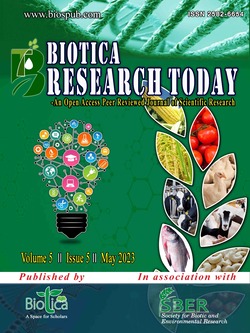
Brassica Allelopathy: A Potential Approach for Sustainable Agriculture
Vidya*
Kittur Rani Chennamma College of Horticulture, Arabhavi, Sangankeri, (University of Horticultural Sciences, Bagalkot), Karnataka (591 218), India
Vijayakumar Rathod
Kittur Rani Chennamma College of Horticulture, Arabhavi, Sangankeri, (University of Horticultural Sciences, Bagalkot), Karnataka (591 218), India
Sharavati Bammanakatti
Kittur Rani Chennamma College of Horticulture, Arabhavi, Sangankeri, (University of Horticultural Sciences, Bagalkot), Karnataka (591 218), India
DOI: NIL
Keywords: Alleolochemicals, Allelopathy, Brassinosteroids, Glucosinalates
Abstract
Intensive agriculture has dominated the world's food production through the use of synthetic fertilizers, pesticides, irrigation technology, chemical herbicides, and improved crop varieties. Even though these developments expand food grain production, but they also contributing to the habitat destruction, land degradation and environmental depletion, as they remain available in the environment for a longer period leading to soil and environmental pollution. Therefore, allelopathic potential of various crop species is one of the novel approaches to enhance the crop production and to minimize the adverse impact of synthetic chemicals.
Downloads
not found
Reference
Jabran, K., Mahmood, K., Melander, B., Bajwa, A.A., Kudsk, P., 2017. Weed dynamics and management in wheat. In: Advances in Agronomy. Volume 145. (Ed.) Sparks, D.L. Elsevier Inc. pp. 97-166. DOI: https://doi.org/10.1016/bs.agron.2017.05.002.
Nguyen, V.T., Stewart, J., Lopez, M., Ioannou, I., Allais, F., 2020. Glucosinolates: Natural occurrence, biosynthesis, accessibility, isolation, structures, and biological activities. Molecules 25(19), 4537. DOI: https://doi.org/10.3390/molecules25194537.
Pontoppidan, B., Hopkins, R., Rask, L., Meijer, J., 2003. Infestation by cabbage aphid (Brevicoryne brassicae) on oilseed rape (Brassica napus) causes a long lasting induction of the myrosinase system. Entomologia Experimentalis et Applicata 109(1), 55-62. DOI: https://doi.org/10.1046/j.1570-7458.2003.00088.x.
Rehman, S., Shahzad, B., Bajwa, A.A., Hussain, S., Rehman, A., Cheema, S.A., Abbas, T., Ali, A., Shah, L., Adkins, S., Li, P., 2019. Utilizing the allelopathic potential of Brassica species for sustainable crop production: a review. Journal of Plant Growth Regulation 38, 343-356. DOI: https://doi.org/10.1007/s00344-018-9798-7.
Stashenko, E.E., Martínez, J.R., 2007. Sampling volatile compounds from natural products with headspace/ solid-phase micro-extraction. Journal of Biochemical and Biophysical Methods 70(2), 235-242. DOI: https://doi.org/10.1016/j.jbbm.2006.08.011.
